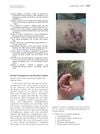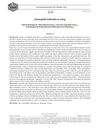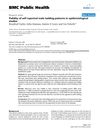 15 citations,
April 2003 in “Journal of Dermatological Science”
15 citations,
April 2003 in “Journal of Dermatological Science” Gene differences may affect baldness treatment response in Korean men.
 34 citations,
February 1992 in “The Journal of Clinical Endocrinology and Metabolism”
34 citations,
February 1992 in “The Journal of Clinical Endocrinology and Metabolism” Finasteride and minoxidil together promote hair growth better than either alone.
 58 citations,
January 2007 in “Dermatology”
58 citations,
January 2007 in “Dermatology” Minoxidil use in children may cause heart issues.

A 72-year-old man was diagnosed with a rare skin form of Rosai-Dorfman disease after years of misdiagnosis.
 42 citations,
January 2007 in “Pediatric dermatology”
42 citations,
January 2007 in “Pediatric dermatology” Low-potency steroids can cause serious side effects in people with skin conditions like Netherton syndrome.
 29 citations,
February 2007 in “Hormone and metabolic research”
29 citations,
February 2007 in “Hormone and metabolic research” Blocking the androgen receptor in skin cells reduces their growth response to male hormones, suggesting a possible treatment for skin conditions linked to androgens.
5 citations,
February 1992 in “Journal of chromatography A/Journal of chromatography” The document concludes that a fast, accurate method to measure vitamin E derivative in cosmetics was developed.
 January 2021 in “ACTA SCIENTIAE VETERINARIAE”
January 2021 in “ACTA SCIENTIAE VETERINARIAE” A dog with skin issues improved with prednisone after accurate diagnosis.
 35 citations,
March 2005 in “Journal of Investigative Dermatology”
35 citations,
March 2005 in “Journal of Investigative Dermatology” Potassium channel openers like minoxidil help hair grow by acting on hair follicles.
 33 citations,
October 2004 in “Archives of Dermatological Research”
33 citations,
October 2004 in “Archives of Dermatological Research” Large prostate links to more hair loss, but age of onset doesn't affect it.
 1 citations,
November 2017 in “International journal of clinical endocrinology and metabolism”
1 citations,
November 2017 in “International journal of clinical endocrinology and metabolism” The supplement with Myo-inositol and D-chiro-inositol improves metabolic symptoms in PCOS, especially when combined with metformin.
 14 citations,
June 2013 in “Joint Bone Spine”
14 citations,
June 2013 in “Joint Bone Spine” ACTH may be an effective first-line treatment for acute calcium pyrophosphate crystal arthritis.
 36 citations,
August 2009 in “PubMed”
36 citations,
August 2009 in “PubMed” The review suggests seeing a dermatologist for scarring hair loss and using treatments like minoxidil or finasteride for common male and female pattern hair loss.
 32 citations,
December 2004 in “BMC Public Health”
32 citations,
December 2004 in “BMC Public Health” Men can report their own balding patterns well enough for large health studies.
 1 citations,
February 1988 in “The BMJ”
1 citations,
February 1988 in “The BMJ” The document explains different hair and scalp conditions, including common hair loss after pregnancy or illness, drug-induced hair loss, hereditary excessive hair growth, patterned baldness, autoimmune hair loss, and permanent loss due to skin disease, with generally limited treatment options.
December 2020 in “Rossijskij žurnal kožnyh i veneričeskih boleznej” People with severe alopecia areata often have lower vitamin D levels and may have other autoimmune or allergic conditions.
 6 citations,
November 2017 in “Scientific reports”
6 citations,
November 2017 in “Scientific reports” The R343H mutation in the VDR gene causes vitamin D-resistant rickets with alopecia by impairing specific gene activity.
 1 citations,
June 2020 in “Actas Dermo-Sifiliográficas”
1 citations,
June 2020 in “Actas Dermo-Sifiliográficas” RF-mesotherapy with dutasteride may be a promising alternative treatment for hair loss.
 November 2022 in “The Indian journal of chest diseases & allied sciences”
November 2022 in “The Indian journal of chest diseases & allied sciences” Isoniazid can rarely cause hair loss, which is reversible after stopping the drug.
13 citations,
January 2002 in “Biochemical and biophysical research communications” Interferon β from hair cells stops the growth of other hair cells.
 185 citations,
March 2011 in “The Journal of Sexual Medicine”
185 citations,
March 2011 in “The Journal of Sexual Medicine” Finasteride for hair loss can cause long-lasting sexual side effects like low libido and erectile dysfunction.
December 2022 in “Faculty Opinions – Post-Publication Peer Review of the Biomedical Literature”  9 citations,
September 2010 in “Dermatologic Therapy”
9 citations,
September 2010 in “Dermatologic Therapy” Finasteride for hair loss is safe and does not increase the risk of high-grade prostate cancer.
 138 citations,
August 1985 in “Journal of The American Academy of Dermatology”
138 citations,
August 1985 in “Journal of The American Academy of Dermatology” Minoxidil promotes hair growth in male pattern baldness.
June 2021 in “Egyptian Journal of Dermatology and Venereology” Psoriasis, acne, and hair loss are linked to unhealthy cholesterol levels, increasing heart disease risk.
January 2024 in “Ageing & longevity” Good nutrition and essential trace elements like zinc, selenium, and iron are important for a strong immune system and reducing COVID-19 severity.
3 citations,
January 2016 in “Case reports in dermatological medicine” An 80-year-old man grew extra hair on his forearms after starting Alzheimer's medication rivastigmine.
 1 citations,
March 2023 in “International journal of rheumatic diseases”
1 citations,
March 2023 in “International journal of rheumatic diseases” Relatives of lupus patients show signs of immune system activity but not full-blown lupus.
43 citations,
July 2017 in “International journal of pharmaceutics” Using β-cyclodextrin derivatives improves the solubility and bioavailability of steroidal drugs.
1 citations,
January 2024 in “International journal of molecular sciences” MicroRNAs could be key biomarkers and therapeutic targets for PCOS.





















